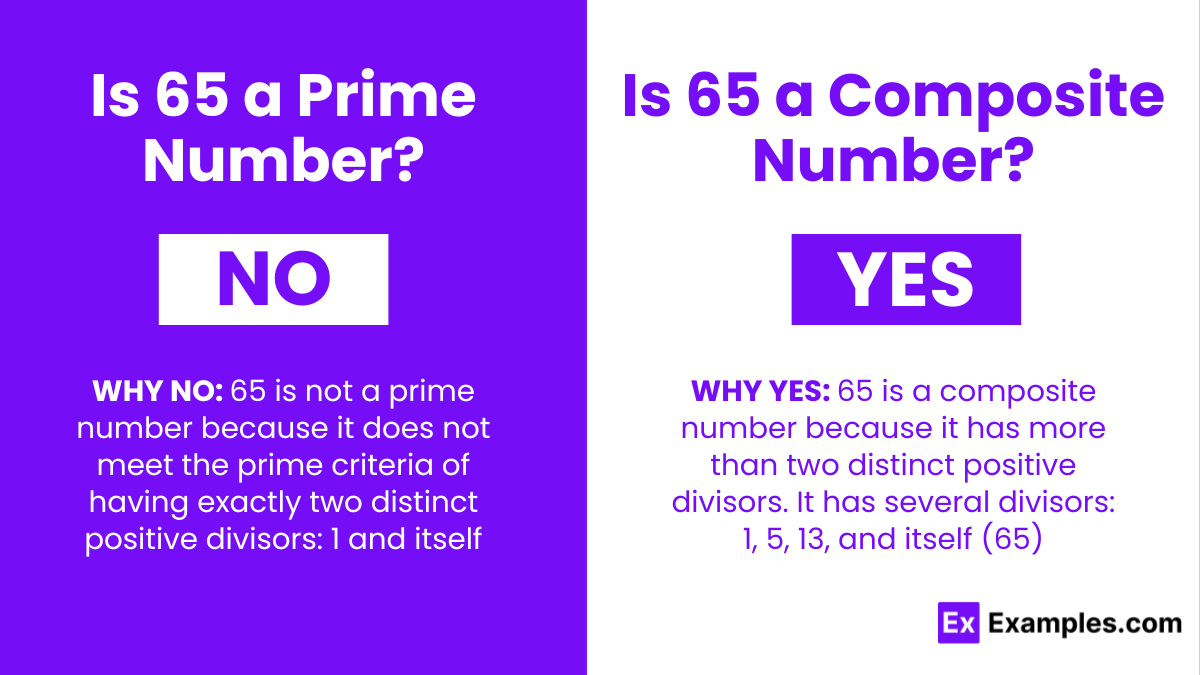Is 65 a prime number or a composite number?
Prime
Composite
Neither
Both


Why No: 65 is not a prime number because it does not meet the prime criteria of having exactly two distinct positive divisors: 1 and itself. Instead, 65 has divisors 1, 5, 13, and 65.
Why Yes: 65 is a composite number because it has more than two distinct positive divisors. It has several divisors: 1, 5, 13, and itself (65).
| Property | Answer |
|---|---|
| Is 65 a prime number? | No |
| Is 65 a composite number? | Yes |
| Is 65 a perfect square? | No |
| Factors of 65 | 1, 5, 13, 65 |
| Multiples of 65 | 65, 130, 195, 260, 325, 390, 455, 520, 585, 650 |
| Cube Root of 65 | Not a whole number |
| Square of 65 | 4225 |
| Square Root of 65 | 8.062 |
| Is 65 a Perfect Cube? | No |
| Is 65 an Irrational number | No |
| Is 65 a Rational number | Yes |
| Is 65 a Real number | Yes |
| Is 65 an Integer | Yes |
| Is 65 a Natural number | Yes |
| Is 65 a Whole number | Yes |
| Is 65 an Even or odd number | No (65 is an odd number) |
| Is 65 an Ordinal number | Yes |
| Is 65 a Complex number | Yes (as all real numbers are also complex numbers) |
The factors of 65 are 1, 5, 13, and 65 itself. These numbers can divide 65 evenly, reflecting its status as a composite number with more than two divisors.
65 is recognized not as a prime number but as a composite number because it has divisors other than 1 and itself, specifically 1, 5, 13, and 65. This distinguishes it from prime numbers, which have exactly two distinct positive divisors. While the number 65 may not be as frequently associated with harmony or spiritual significance in various cultures as some numbers, it serves as a reminder of the diversity and utility of numbers in mathematics. Its status as a composite and odd number underscores the variety of numerical properties and their applications in different fields, highlighting the integral role of mathematics in understanding the world around us.
The nearest prime numbers to 65 are 61 (before) and 67 (after). These prime numbers are the closest to 65 on the numerical line.
The prime factors of 65 are 5 and 13. These are the prime numbers that multiply together to give 65, showcasing its unique prime factorization.
No, 65 is not a perfect square. A perfect square is a number that can be expressed as the square of an integer, and there is no integer whose square equals 65.
Text prompt
Add Tone
10 Examples of Public speaking
20 Examples of Gas lighting
Is 65 a prime number or a composite number?
Prime
Composite
Neither
Both
What are the prime factors of 65?
2 and 5
3 and 11
5 and 13
7 and 9
Which of the following statements is true about the number 65?
65 has only two factors
65 is divisible by 7
65 is a multiple of 5.
65 is a perfect square
What is the smallest prime number that divides 65?
2
3
5
7
If a number has exactly three factors, it is considered a prime number. Is 65 a prime number based on this statement?
Yes
No
Maybe
Cannot be determined
Is 65 a prime number if it is divisible by 13?
Yes
No
Maybe
It depends
Which number is not a factor of 65?
1
5
10
13
If you add the digits of 65 together, is the result a prime number?
Yes
No
Maybe
Cannot be determined
What is the result of subtracting 1 from 65 and checking its primality?
64, which is prime
64, which is composite
63, which is prime
63, which is composite
Which of the following numbers is divisible by 65?
125
130
100
90
Before you leave, take our quick quiz to enhance your learning!

